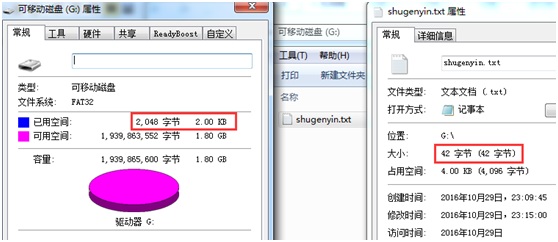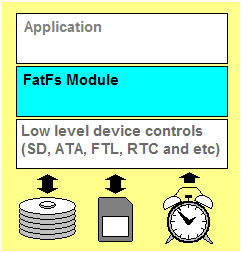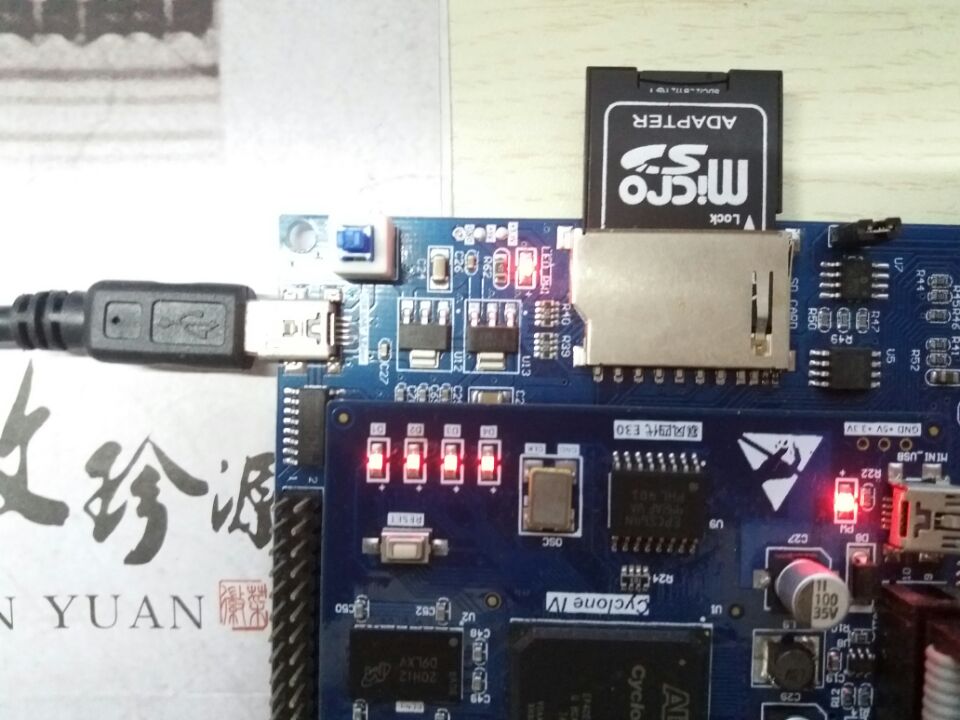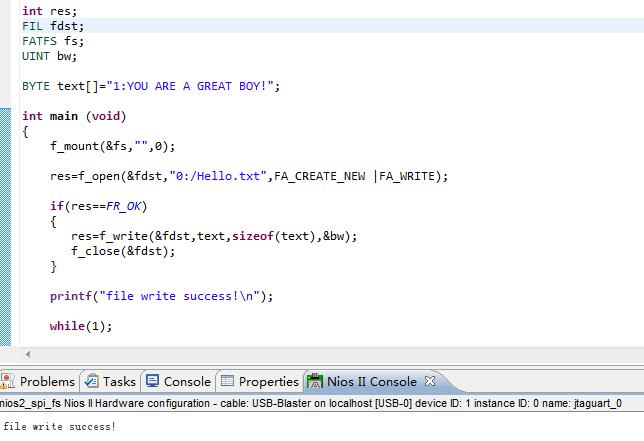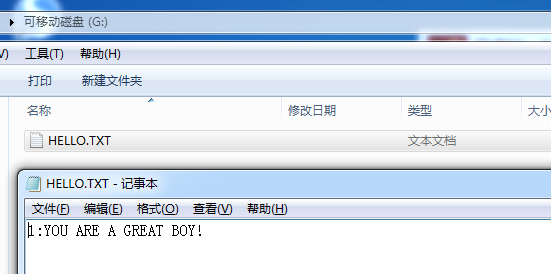NIOS2随笔——FAT32文件系统
Posted
tags:
篇首语:本文由小常识网(cha138.com)小编为大家整理,主要介绍了NIOS2随笔——FAT32文件系统相关的知识,希望对你有一定的参考价值。
1. 概述
FAT32是Windows系统硬盘分区格式的一种,最大单文件大小为4GB。
FAT32由下面3个部分组成:
MBR: Master Boot Record, 512KB, 硬盘的物理0地址,以0x55aa结束分区;
FAT: File Allocation Table, 512*2KB, 32位的文件分配表,最大单文件大小为4GB,以0x55aa结束分区;
File and Directory Data:数据与目录区域。
比如,一个42B的文件会占用2K=4个sector(512KB)。
2. FATFS源码介绍
FATFS是免费开源的FAT文件系统,特别适合小型嵌入式设备使用,FATFS支持FAT12/FAT16/FAT32。
FATFS文件系统结构:
FATFS源码文件如下表:
文件名 | 功能 | 说明 |
ffconf.h | FATFS模块配置文件 | 需要根据需求配置参数 |
ff.h | FATFS和应用模块公用的头文件 | 不修改 |
ff.c | FATFS模块源码 | 不修改 |
diskio.h | FATFS和disk I/O模块公用的头文件 | 不修改 |
diskio.c | FATFS和disk I/O模块接口层文件 | 与平台相关的代码,需要根据介质编写函数 |
integer.h | 数据类型定义 | 与编译器相关 |
option文件夹 | 可选的外部功能 | 比如要支持汉字需要修改 |
3. FATFS源码移植
FATFS移植的三个步骤
数据类型:在integer.h里面去定义好数据的类型
配置:通过ffconf.h配置FATFS的相关功能
函数编写:在diskio.c中进行底层驱动编写,一般需要编写5个函数disk_status, disk_initialize
disk_read, disk_write, disk_ioctl, get_fattime
在ffconf.h中,主要修改支持的函数齐全程度,支持的字体格式等。
#define _FS_MINIMIZE 0 /* This option defines minimization level to remove some basic API functions. / / 0: All basic functions are enabled. / 1: f_stat(), f_getfree(), f_unlink(), f_mkdir(), f_truncate() and f_rename() / are removed. / 2: f_opendir(), f_readdir() and f_closedir() are removed in addition to 1. / 3: f_lseek() function is removed in addition to 2. */ #define _CODE_PAGE 1 /* This option specifies the OEM code page to be used on the target system. / Incorrect setting of the code page can cause a file open failure. / / 1 - ASCII (No extended character. Non-LFN cfg. only) / 437 - U.S. / 936 - Simplified Chinese (DBCS) */ #define _USE_LFN 0 #define _MAX_LFN 255 #define _LFN_UNICODE 0 /* This option switches character encoding on the API. (0:ANSI/OEM or 1:UTF-16) / To use Unicode string for the path name, enable LFN and set _LFN_UNICODE = 1. / This option also affects behavior of string I/O functions. */
在diskio.c中,修改对应的驱动程序(SPI底层驱动查看博文"NIOS2随笔——SD卡之SPI操作
"),修改好的代码如下:
//filename: diskio.c
//author: shugen.yin
//date: 2016.12.22
//function: FATFS Lower layer API
#include "diskio.h" /* FatFs lower layer API */
#include "sd_spi.h"
//初始化磁盘
DSTATUS disk_initialize (
BYTE pdrv
)
{
u8 res=0;
res = SD_Initialize();//SD_Initialize()
if(res)return STA_NOINIT;
else return 0; //初始化成功
}
//获得磁盘状态
DSTATUS disk_status (
BYTE pdrv /* Physical drive nmuber (0..) */
)
{
return 0;
}
DRESULT disk_read (
BYTE pdrv, /* Physical drive nmuber (0..) */
BYTE *buff, /* Data buffer to store read data */
DWORD sector, /* Sector address (LBA) */
UINT count /* Number of sectors to read (1..128) */
)
{
u8 res=0;
if (!count)return RES_PARERR;//count不能等于0,否则返回参数错误
res=SD_ReadDisk(buff,sector,count);
//处理返回值,将SPI_SD_driver.c的返回值转成ff.c的返回值
if(res==0x00)return RES_OK;
else return RES_ERROR;
}
#if _USE_WRITE
DRESULT disk_write (
BYTE pdrv, /* Physical drive nmuber (0..) */
const BYTE *buff, /* Data to be written */
DWORD sector, /* Sector address (LBA) */
UINT count /* Number of sectors to write (1..128) */
)
{
u8 res=0;
if (!count)return RES_PARERR;//count不能等于0,否则返回参数错误
res=SD_WriteDisk((u8*)buff,sector,count);
//处理返回值,将SPI_SD_driver.c的返回值转成ff.c的返回值
if(res == 0x00)return RES_OK;
else return RES_ERROR;
}
#endif
#if _USE_IOCTL
DRESULT disk_ioctl (
BYTE pdrv, /* Physical drive nmuber (0..) */
BYTE cmd, /* Control code */
void *buff /* Buffer to send/receive control data */
)
{
DRESULT res;
switch(cmd)
{
case CTRL_SYNC:
SD_CS_SET;
if(SD_WaitReady()==0)res = RES_OK;
else res = RES_ERROR;
SD_CS_CLR;
break;
case GET_SECTOR_SIZE:
*(WORD*)buff = 512;
res = RES_OK;
break;
case GET_BLOCK_SIZE:
*(WORD*)buff = 8;
res = RES_OK;
break;
case GET_SECTOR_COUNT:
*(DWORD*)buff = SD_GetSectorCount();
res = RES_OK;
break;
default:
res = RES_PARERR;
break;
}
return res;
}
#endif
DWORD get_fattime (void)
{
return 0;
}
//动态分配内存
void *ff_memalloc (UINT size)
{
return (void*)size;
}
//释放内存
void ff_memfree (void* mf)
{
}4. 搭建软硬件环境
这里沿用博文"NIOS2随笔——SD卡之SPI操作"中的工程,将TF卡(2GB)借SD卡套插入SD卡卡座,如下图所示:
编写main函数,最终编译运行:终端显示file write成功
5. 最终结果
用读卡器打开TF卡,HELLO.TXT文件生成,打开文件内容正确写入。
本文出自 “shugenyin的博客” 博客,请务必保留此出处http://shugenyin.blog.51cto.com/4259554/1885330
以上是关于NIOS2随笔——FAT32文件系统的主要内容,如果未能解决你的问题,请参考以下文章
